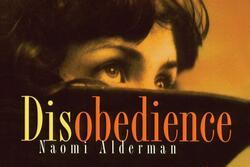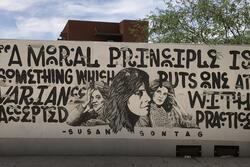Zog Nit Keynmol: The Songs of Jewish Partisans
On Friday, I’ll start to drive East—leaving Tucson via Utah’s national parks, the sprawling Midwest, and finally the Blue Ridge Mountains. I’m starting a master’s degree in Folklore in three weeks, give or take a few days, and want to satisfy my curiosity about states I’ve yet to see along the way. My companion for this drive (besides my actual human companion, Max) will be a stack of books that I hope will help me figure out the finer details of what I plan to study.
In the last few weeks, I’ve gone into a frenzy of last-minute activity to get prepared for both moving and being a student again. Some of this has been merely logistics (ensuring electricity will be turned on in my apartment, purchasing a mattress, fretting about finding an internship to cover what my stipend won’t), but I’ve also spent a fair amount of time trying to narrow the broad interests I wrote about in my application into a navigable thesis project. My program is only two years, which feels long at the outset, but will certainly fly by once I’m in the midst of coursework.
When I applied for this program, I initially envisioned extending my undergraduate research in abortion rights and history. I was nervous about straying from an academic path I had tread before and figured most individuals who went on to do graduate work expanded on themes and ideas that had spoken to them during their first four years of higher education. I was increasingly anxious as the post-admission months crept by, realizing as I attempted to explain my plans to friends, family, and strangers that I didn’t have a topic that really moved me yet. I was still caught in the same loop of fear that had clouded my time as a History major—the fear of being unemployable after graduation.
What broke the spell? It didn’t happen all at once. In May, I spent time at the Jewish History Museum in Tucson, where I grabbed a pamphlet about Jewish partisans emblazoned with the mantra that carried so many through the war: Zog nit keynmol az du geyst dem letstn veg (Never say that you have reached the final road). A month later, I started packing my books in boxes and rediscovered the text Max bought me for Hanukkah three years ago, Revolutionary Yiddishland. Finally, two weeks ago, my feet propped up on a couch and my browser open to a webpage with recordings of the music of Holocaust resistance, I asked Max, “What if I studied Jewish partisans and learned Yiddish and traveled to archives that have saved their materials?” He raised his eyebrows. “That sounds extremely up your alley.” I grinned for the rest of the day.
It’s hard to explain how urgent this topic feels. On the one hand, it seems obvious to want to draw strength from Jewish individuals who fought back in a time of political crisis. The other appeal is one that exists for me on an almost primal level—it’s the reason I was able, despite having zero stomach for violence, to sit through Inglorious Basterds. I wanted (and still want) to see Jewish people not just survive, but actively protect themselves and their communities. I am old enough now to understand that safety is not guaranteed and that passivity is not an option against fascism.
Of course, Jewish partisans are far more compelling than any revenge fantasy cooked up by Quentin Tarantino because they were real and braver than I’m ever likely to be. They deserve my academic attention, and personal gratitude.
Now, I have a stack of self-assigned texts I want to commit to memory as I make my way across the country: Surviving the Holocaust with the Russian Jewish Partisans, Voice From the Forest: Memoirs of a Jewish Partisan, and Revolutionary Yiddishland, dug back out from a sealed and packed box. I haven’t stepped foot onto campus yet, but already feel exhilarated by what I’ll be able to access in due time. My wish-lists are comprised of reels and tapes and precious pieces of paper—memories of resistance and strength and loss, saved and preserved and waiting to be read. I haven’t settled on a final project yet, nor have I figured out my specific focus, but I feel prepared to find those answers now that I have passion propelling me forward. I have faith that this semester will be eye-opening. Wish me luck!
If you’re interested in Jewish partisans, the Yiddish language, and the music and writing that bridge them together, JWA has several resources to get you started:
1. Recordings of Yiddish songs like Mayn Rue Platz (My Resting Place), performed by A Besere Velt (A Better World), The Yiddish Community Chorus of the Boston Workmen's Circle.
2. Encyclopedia articles on Jewish women partisans like Vitka Kempner-Kovner and Zelda Nisanilevich Treger.
You can also find recordings of Jewish Partisan songs like Zog nit keynmol (Never Say).








Justyna´s narrative, Gusta Draenger, from the Jewish Youth who fought against the nazis in Krakow.She and many other definetely deserve our academic attention and homage